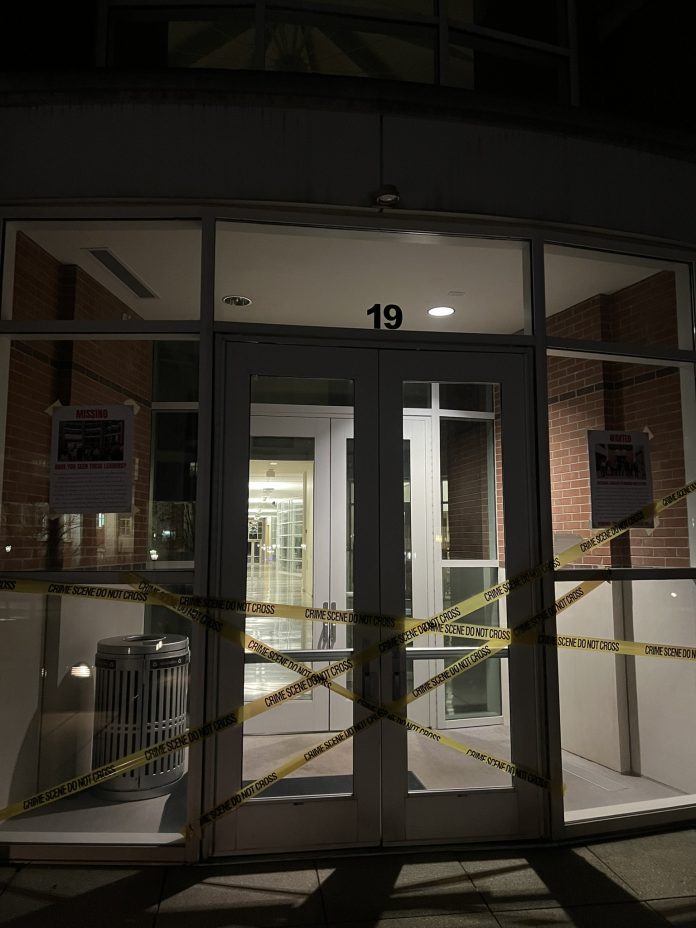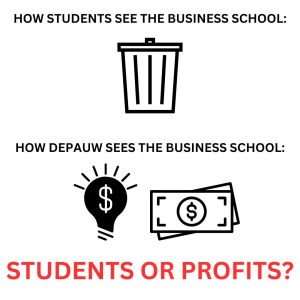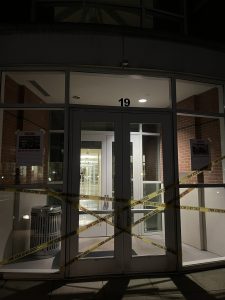
On the evening of April 4, Alex Preston ‘25 was distributing anti-Business School flyers across Harrison Hall for her History of American Education assignment. Six days later, she was questioned at the DePauw Police Station for alleged violation of the university’s Code of Conduct.
“I was just really nervous. Like I've never had that happen before,” Preston said. “It just made my anxiety a lot worse and [after] learning not everybody in my class [was] called – it was just me and another person … I was kind of just like, why me?”
Preston was the first student to be questioned by the DePauw Public Safety about her project for Associate Professor and Department Chair of Educational Studies Derek Ford’s History of American Education class. The project, which was 20% of the final grades, required students “to stage a public intervention at DePauw University,” which aims to “expose and challenge something we don’t notice or take for granted” and “‘shock’ people to get them thinking critically.”
This followed a course analysis on Martin Parker’s book, “Shut Down the Business School: What’s Wrong with Management Education.” The reading aligns with a class-based critique on DePauw’s establishment of the School of Business and Leadership while analyzing the evolution of the “American school.”
Preston printed a set of flyers to showcase DePauw students and administrators’ perception of the Business School. She decided to place the materials around the tables of Harrison Hall instead of hanging materials on the walls to avoid ramifications.
“I just made a flyer [which] said how DePauw students see the Business School, that had [an image of a) trash can, like a closed lid … because the decision was a very closed off decision,” she said. “And the other part was how DePauw’s [administration saw] the Business School, and it was just like money … because all they see it [is] as a way to make money.”

The following day, the Community Standards Board was notified about the flyers, prompting an investigation by DePauw Public Safety. On April 10, Preston was called for a meeting with DePauw Chief of Police Charlene Shrewsbury. However, due to Chief Shrewsbury being unavailable, Assistant Chief of Police Rick Keller met with Preston instead.
“I told [Officer Keller] the same thing I've been telling everybody: it was just a class project. I didn't mean anything [harmful] but I was just doing my work like this was worth part of my grade,” she said. “It was all almost like a full circle moment of like, this is what we're reading about. This is what we're living.”
As of April 19, DePauw Police has not responded to The DePauw's requests for an interview until permitted by the Community Standards Board and while investigation is ongoing.
Meanwhile, Emmaline Purciful '25, another student from the class, put up crime scene tape and "Wanted" posters of President Lori S. White and Board of Trustees memb

ers across the Green Center of Performing Arts on April 4. This was the same location of the Feb. 8 Posse Scholar protest, in which a group of Posse Scholar students protested alleged neglect and mistreatment by the university.
"We wanted to call attention to that and what was being done to [the Posse Scholars program]," Purciful said. "They don't care if we, the students, want Posse New York – they just care about where the funds are going to be for the future."
On the other hand, Evie Grimmitt ‘25 designed 60 posters which read “$40 million for the future, $0 for the present,” referencing DePauw’s investments for the Business School. The posters were taped on walls of the first floor of

Harrison Hall.
The next day, when Ford’s class decided to walk around campus to see each student's projects, Purciful realized their project materials were all taken down.
Starting on April 15, students from Ford’s class were called into meetings with Director of Community Standards Kelsey Wetli to evaluate collected evidence and determine appropriate sanctions. Purciful and Grimmitt allegedly violated Code of Conduct No. 10, involving “disorderly conduct” by “destroying, damaging or disrupting University property.” Alongside Preston, the two students were also reported for breaching Code of Conduct No. 20 due to “violation of, any university, local, state or federal law, ordinance or regulation by violation of the Campus Publicity Display Policy.”
Grimmitt shared that DePauw Public Safety had evaluated security camera footage from April 4 in putting together their incident report, noting, “it had every single movement down to the things I was holding … anything that was able to be seen on security cameras was written in detail.”

Meanwhile, Purciful described feeling disrespected by Director of Community Standards Kelsey Wetli during their meeting, and suggested that there were inconsistencies in the evidence presented against her.
"[Wetli] called me by the wrong name the entire time, after I corrected her and told her my preferred name. She told me that she just couldn't say my preferred name," she said. "[And] in the police report, there were a number of discrepancies … it says that I'm not in [Professor Ford's] class when I clearly am ... It also says that we ... duct taped the door shut, [but] it was masking tape.”
After meeting with Community Standards representatives, Purciful was issued a formal warning from the university and scheduled for a required educational meeting with Assistant Vice President of Student Affairs Dorian Shager. Purciful’s request for Ford’s presence during the meeting was rejected, as page 17 of the Student Handbook outlines that “advisors, guardians, and/or counsel are not permitted to attend Intake Meetings and Review Board meetings.”
Purciful was also required to create a flyer outlining the Campus Publicity and Display Policy to educate other students. However, she decided to file an appeal to Vice President of Student Affairs John Mark Day for exemption from these sanctions.
"It sets a precedent that the university has a right to say what is educational and what isn't," she said, "without recognizing our projects as educational projects and seeing them as a disruption."
According to the Student Handbook, students under Community Standards sanctions can submit appeals on the basis of new evidence that was unavailable during initial investigation, procedural errors in the review process, errors in Student Handbook policy interpretation, or the appropriateness of the sanction.
Meanwhile, Ford was not called into question by DePauw Police, which he found “troubling” as he persisted in supporting his students.
“I am the one responsible [for the incident], and the fact that … I wasn’t called in for questioning by the cops, right?” Ford said. He argued that this “means that nobody cares about faculty and what our classes are doing. It’s just like policing students and [treating] them like criminals.”
After his students were questioned by DePauw Police and accused of violating student handbook regulations, Ford wrote a letter to Community Standards representatives to address the alleged Code of Conduct Violations.
“Nowhere and at no time did I, as their professor, indicate that their assignments not violate the student handbook or any other university policies or rules,” the letter read. “I don’t believe I should have or needed to specify they don’t break any state or federal laws, but I certainly should have indicated they should not violate the student code of conduct and provided a link to the student handbook.”
Dr. Day and Shager declined The DePauw’s requests for direct comment on Ford’s response.
“We rely on the faculty to create assignments that will be most educationally purposeful for their students,” Dr. Day said. “And so it wouldn't be appropriate for me to comment on a faculty member’s projects.
Ford highlighted student concerns about the impact of the incident on their student records, including international students’ F-1 visa status and Residential Assistants’ eligibility for their positions. However, Shager said the sanctions would not be reflected on students’ transcripts, given the separation of academic documents from Community Standards documents. The latter would only be maintained “six years from graduation or last date of attendance,” according to the Student Handbook.
Dr. Day emphasized the importance of students’ awareness about Student Handbook guidelines.
“One thing that we want to make sure that all students understand is what rights they have with regards to freedom of expression,” he said. “We are thrilled to sit down with students and talk about … how to help their ideas fit within what the guidelines are, so that they can be exercising their freedom of expression in the most effective way possible.”
